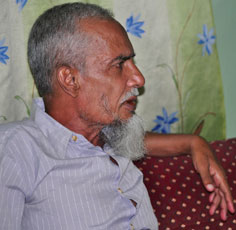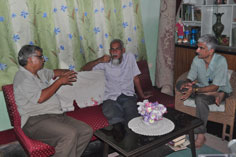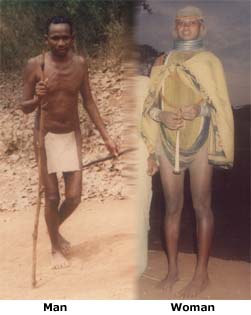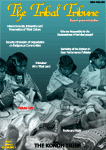Ali in Tribal Land
Mr. Syed Hasan Ali Rizwan, his close friends call him Munshi and others Ali or Mr. Ali, always displayed, according to his close friends, an irrepressible desire to explore and experience new things. Born in a Muslim family in the year 1954, his early education was in Stewart School, an English medium missionary school in Cuttack, his youth spent in the prestigious Ravenshaw College, Cuttack and Law education at the Madhusudan Law College, Cuttack. While his profession as a lawyer in Odisha High Court, and Supreme Court of India, made his persona a crucible, there emerged secular Ali without compromising with his devotion to Prophet.
 |
Hard life of a lawyer never dimmed his infatuation with soft skills, which possibly started early during his stint as a freelance journalist for The Junior Statesman, and as the Editor for the magazine of the Rotaract Club of Cuttack. Soft skill is necessary even in the court, in the presentation of cases before the Hon’ble Judges-he says. Given his proclivity to explore new experience, he readily agrees to teach soft skills to the post graduate students of the Institute of Mathematics and Applications (IMA), a state government institute in Bhubaneswar, Odisha. In the same breath he agreed to teach young tribal students in Schedule Caste and Schedule Tribe Research and Training Institute (SCSTRTI), an organ of Odisha Government. His maiden interaction with these tribal students was quite impressive. Ali should go to Koraput and Malkangiri, the two tribal dominated districts, to provide the benefit of his tutelage to the tribal students on their soil- that is what the mentors felt. Mr.Ali obliged. The Tribal Tribune wanted to record his experience. Managing Editor of The Tribal Tribune, Professor Birendra Kumar Nayak talked to him What Mr Ali said is summarized as follows. |
Ali teaches tribal students
How he teaches? Says he, ‘I wanted to judge their potential. I had a picture, which showed a village, a dog, a river, some houses and things like that and showed to the 57 students who were in the class. I asked each to write one sentence in English. A student writes one sentence and passes it to another who adds a sentence and passes to third, and this continues. After twenty sentences, the picture got completely described. After this they started adding, ‘there is a crocodile in the river’, ‘the boy on the riverside goes for a swim’, ‘the crocodile tries to catch him’, ‘the dog tries to save the child’ and things like that, though these were not there in the given picture. So they were using the imagination, and added new sentences and a story emerged from that. They made spelling mistakes, they made grammatical mistakes but they had the imagination. I corrected that piece and along with the picture, I printed it out and gave each of them a copy of the story. After that, I started interacting with them in the 7 days program.’
Ali’s foray to tribal land
Prof. Swadhin Pattanayak, the Director of IMA, had motivated Ali into teaching. Why not he goes to Koraput?- prof Pattanayak suggested. Ali did not refuse though as he says, ‘I had never been to Koraput; I had never been to a tribal area. Yet I did go to Koraput and taught in two schools. One was in Machhput and other was in Podagada. These schools had shown very bad result earlier and I went in the month of February for 10 days. The result somehow improved tremendously 30 odd percent to 70 odd percent ’ Impressed with Ali’s Koraput stint, Prof. Pattnayak proposed Ali to visit Malkangiri. Malkangiri is a Naxal infested area. Ali was apprehensive. But how could Ali let the possibility of a new experience slip from his hand? He agreed. He was assigned three blocks of Malkangiri to cover. He soon realized that his apprehensions were futile because, as he says, ‘there the people came to know me as working in their interest’ and they were coming to him, talking to him. ‘I never had any occasion to know whether one was a Naxalite or was an extremist or whatever’. The people, there, were so impressed with the sincerity of Ali that even Naxals had sent advises and alerts through a messenger regarding how he should move in nights. He was asked to ‘sit in the front seat of the vehicle and keep the roof light on so that we can identify him’. Why did people, there, developed so much liking for Ali? Because, there, he was not only interacting with the students and teachers of the school but also with the villagers, discussing with them as to why their children were dropping out? Why can’nt they see that they have a rosy future if they don’t drop out, he would ask the parents.

In conversation with Prof. Birendra Kumar Nayak and Prof. Banikanta Mishra
Why really they drop out?
‘Their festivals, their parabs are entirely different from ours. The government holidays are based on our festivals like Durga Puja ,Eid and all that. They do not have these. Government gives them holiday on Sunday. But they want a holiday on the day haat (local market) sits. So holidays should be localized to that area. They go for local parabs, they go for our Durga Puja and after Puja, come ‘their’ parabs. Thus they vanish from schools for months.’
On schools in tribal areas
‘All these tribal schools are huge structures, lovely buildings in the midst of nowhere. What is the point? You are producing nothing and this system of gathering tribal students and putting them in schools and feeding them and allowing them to pass year after year till they come to the final exam, and then they fail’
Teachers‘ Mandate
‘The teachers are asked to get the students for school; taking classes is not the priority. That is their mandate. Suppose there has to be 200 students in one school and 110 present on one day and other 90 are absent. The teacher won't teach the 110 students. He would be told to get the 90 back. So he spends 15 days to get the 90 students back. So the teaching suffers’
Absenteeism of teachers
‘ Earlier absenteeism was rampant amongst teachers. Now, in hushed tones, everybody says that teachers no longer remain absent. The day they remain absent they have to pay Rs.120/- to Anna brothers (so addressed the Naxalites in the area). They have to, that is the fine. Now you find no teacher is absent in school. Because paying Rs.120/- as fine is quite severe.’
On Naxals
‘They are doing some service to the people. Contrary to belief, I don’t think the common man is affected; some collateral damage however, does take place. I was told in the collector’s office ‘if a stranger accosts you and asks you any question even a personal one, do not get angry; just answer it.’ I was going to a school. At Mathili, I stopped my vehicle to take tea. Two persons came and asked me, ‘are you going to such and such place?’ They were referring to the place I was going. I said, ‘yes’. They said, ‘you can’t go’ I did not argue with them. I said ‘O.K., I will go back to Malkangiri’ They asked,’ Can you travel by a mobike?’ I said,’yeah, if it is within 15-20 Kms, I can. If it is farther than that then no.’ It was 18 kms in side jungle. These persons took with them, on two bikes, my companion and me, and served us lunch. They had the input that I am vegetarian, and served me vegetarian food; the other person was served non-vegetarian food.’
|
On Bondas ‘I went to the Bonda Hills. There are two types of Bondas viz., the Upper Bonda and the Lower Bonda. The Lower Bondas are just normal people. The Upper Bondas are the people who have long necks and tattooed faces. At one point of time they were considered to be very dangerous, as they would kill people. There are certain words, which I was instructed not to use. Because such words would provoke them. Common Odia words but for them it is a provocation. It is a very cool place on the Bonda hills. ‘There is one school on the Upper Bonda hills. In Lower Bonda areas, there are schools. But one problem in Malkangiri area is the communication. It can be mostly done on a bike, because the land mines in the area are so fitted that they explode when a loaded vehicle goes. It happens with a four-wheeler but not with a bike. So it becomes very tiresome. ‘The people are by and large very nice. We go and see their customs and marriages. In marriages, there is a small stream and they do a small puja. Tribal temples are never located in the village. They are 2 Kms. outside the village and the marriage is a simple kind of marriage. The bridegroom stands and then the bride stands straddling a small stream and then they pray. I couldn't understand the reason probably they say that all your bad luck or whatever bad that is to happen is flowing behind you and beneath you. Then they have a feast of pork killed fresh from the jungle and salap (an intoxicating juice collected from salap tree). Salap is actually making them lazy, not laid back, because they don't want to work after drinking salap. They don't want to do anything after that.’ |
 |
Tribal students at urban educational institutions
‘I have been to the homes of students from Malkangiri and Koraput, studying in IMA. They are back to their own place. Instead of watching TV here in the IMA kind of atmosphere, and its AC classrooms, they are comfortable back home. Ever since I have been ill, they ask (in Odia) “Sir, kebe ashibe? Aashile aama ghare rahibe” (Sir, when are you coming? When you come, stay with us.). I said (in Odia), “ Munn circuit house re rahuchhi, to ghare kahinki rahibi”. (I stay in circuit house. Why should I stay in your house?)
‘I have never been to that institution which claims 15000 students but I have been dealing with students in Koraput and Malkangiri. For a tribal, Koraput is also an Urban area; Jaipur too. May be for me it is not but it is for them. They want to go back to their original places
‘Two years of continuous exposure may make a difference, may be 20% difference but actually it is not the students, but the elderly, mainly the parents who have to be enthused that their child can go far. Here what is happening- the child goes and comes back. For instance, it is like the difference between somebody goes to US to study and comes back and does something here, and somebody goes to the US to make money and stays back there and dies there friendless, cut off from all his roots,which is the be all and end all of his existence. That kind of scenario they don't want’.
Tribal Aspirations
‘Competitiveness, which is the basis of market economy, is not there in the tribal community and that is the cause of their happiness’ feels Ali. The tribal people are not jealous either. The fields of Bengali settlers ‘ are so lush’. The tribals fields are next to theirs. But he does not feel jealous that his field is not as lush. The jealousy component is missing from their system some where.’
‘They don't have the syndrome that today I have a Maruti and tomorrow I will have a Mercedes. No I don't think so. They are very contented people.’
‘the tribals do not want to join rat race.’
‘There are some students who are aspiring to do something. I want to become an engineer, an agricultural scientist - said many. Only one student said, ‘ I want to become a lawyer’. I said, ‘ come come’ I have to meet you, because everybody is saying that he wants to become an engineer’. He wanted to know how to go about it. This was a program for the plus two counseling. That was the only government plus two tribal college in Malkangiri under tribal department’
But Mr. Ali feels that the tribals should have aspirations but should not lose their identity in pursuing their ambition.
Tribal Awakening
‘They won’t know enough to react. They won't easily know that they are being deprived of something. It is when this idea gets into their head, that they are being deprived of something that they react and react en mass.’
Ali did find some students who are aware of what was happening around them.
On government programmes in tribal areas
‘Government’s instincts are correct. They want to do good work. They give money. The money doesn't reach the people for whom it is meant. It gets sidetracked. It gets waylaid. At least some committed people should go and work there. I am committed. Yet I won't have worked, if I were not paid for it. You can’t pay pittance. If you pay peanuts you get monkeys, you don’t get good workers. So, the government instead of wasting all these money in plans and sub plans should pay people like us. The situation will improve. Give them basic amenities. Don't try to suddenly get them into the 21st century.’
How Ali likes to see the tribals?
 |
‘I would like to see the tribals as they are with improved health care facilities, with some degrees of empowerment so that they can be better off. I am not saying they need to have an internet connection, software understanding, cars, mobikes; no. Better life to lead, better food to eat and better education to get so that they can understand themselves better; and that’s it.’ |



